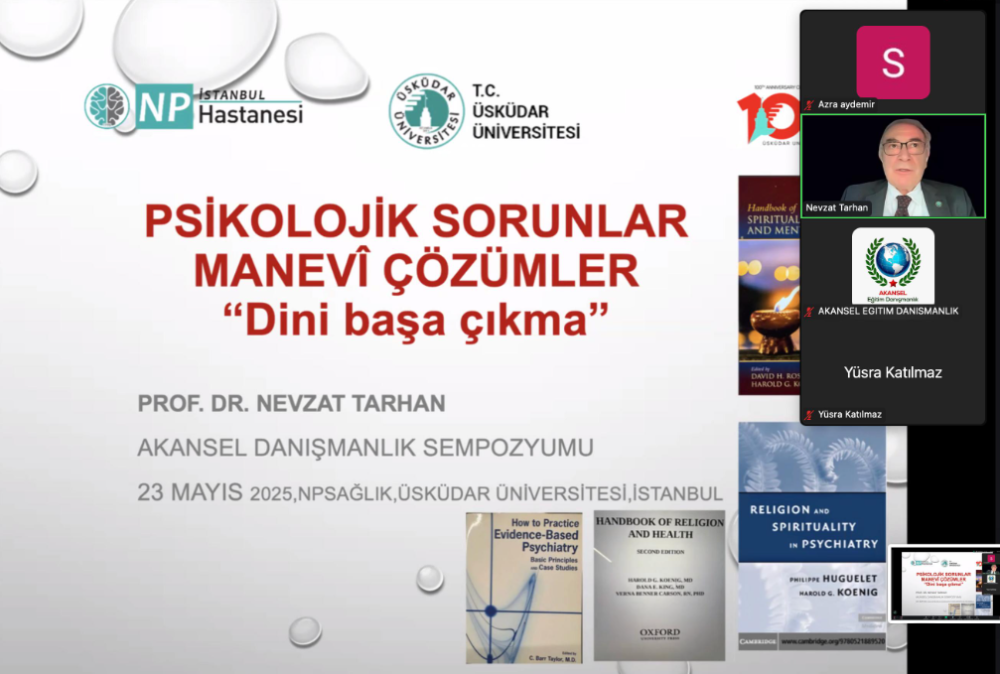Prof. Nevzat Tarhan, President of Üsküdar University, spoke at the recent “Psychology Summit” seminar organized by Akansel Educational Consulting. In his presentation titled “Spiritual Solutions to Psychiatric Problems,” he focused on how spirituality can bolster psychological resilience, particularly in challenging times.
Tarhan discussed the role of abstract reasoning in understanding spiritual and psychological concepts. He explained that individuals with an abstract mindset can see beyond the physical, using the example of an apple seed. While a concrete thinker notices only the seed, an abstract thinker understands that the seed contains a potential apple, representing life and future growth. This ability to perceive deeper meanings is essential in both science and spirituality, Tarhan noted, as it opens doors to exploring various dimensions of existence.
One of the key points made by Tarhan is that intention is fundamental to finding meaning in life. He likened spiritual organs to physical organs, stating that just as humans have hearts and lungs, they also possess spiritual aspects that need nurturing. He argued that meaning exists in all areas of life—from music and art to personal interactions. For instance, an antique item might hold little value in a typical market but could be priceless in the right context where its significance is understood.
In discussing therapeutic values, Tarhan identified ten spiritual powers that can aid in healing, including the ability to evoke awe, which promotes inner calm. He cited Avicenna’s wisdom: “Physicians sometimes cure, but often console.” The feeling of awe can lead to peace and is crucial for managing both positive and negative life events. He referenced Martin Seligman’s concept of ‘authentic happiness,’ suggesting that happiness is not solely dependent on circumstances but is largely shaped by one’s perspective.
Tarhan emphasized that spiritual practices like sincerity, prayer, and gratitude could significantly enhance psychological resilience. He explained that these practices contribute to emotional richness and foster strong social connections. Compassion, honesty, and accountability build trust—an essential component for effective therapeutic relationships.
On self-transcendence, Tarhan explained the need to balance health, wealth, and wisdom. He noted that self-transcendence, a concept Maslow later included in his hierarchy of needs, encourages individuals to help others, reinforcing a sense of fulfillment. Studies indicate that individuals who prioritize spiritual and religious values see up to an 80% decrease in depression rates, linking these experiences to brain areas involved in emotional regulation.
Tarhan also addressed the neuroscience behind sincerity and communication. He detailed how 80% of communication is non-verbal, with sincerity being vital for building trust. When individuals express sincerity, their brains release oxytocin, dopamine, and serotonin, which play roles in bonding and happiness. This biochemical reaction can reduce existential anxieties such as fear of death and the quest for meaning.
He reiterated that trust is the foundation of peace, which is crucial for effective treatment. Without trust, therapeutic progress is difficult. Tarhan encouraged individuals to reflect on their lives, emphasizing that personal growth begins with self-awareness and intention. He advised maintaining a daily journal to track personal milestones and insights, noting that this practice can increase information retention by 50%.
Tarhan concluded by stressing the importance of hope in psychological resilience. He pointed out that instead of merely addressing negative traits in individuals, therapists should identify and cultivate their strengths. This method aligns with positive psychotherapy, which aims to reinforce positive traits rather than solely correct negatives. He stated, “When individuals feel connected to a greater purpose, they develop resilience and hope, essential for navigating life’s challenges.”
He identified anhedonia and lack of willpower as key symptoms of depression, emphasizing that these conditions can manifest without accompanying sadness. He noted that a diagnosis of major depression is considered when symptoms persist for more than 15 days. In treatment, it is vital to personalize approaches, as not all spiritual therapies suit every individual. A comprehensive toolkit should include various options from psychopharmacology to cognitive behavioral therapy and positive psychotherapy.
In summary, Prof. Tarhan’s insights highlight the intersection of spirituality and mental health, demonstrating how fostering a connection to meaning and purpose can significantly improve psychological well-being.



